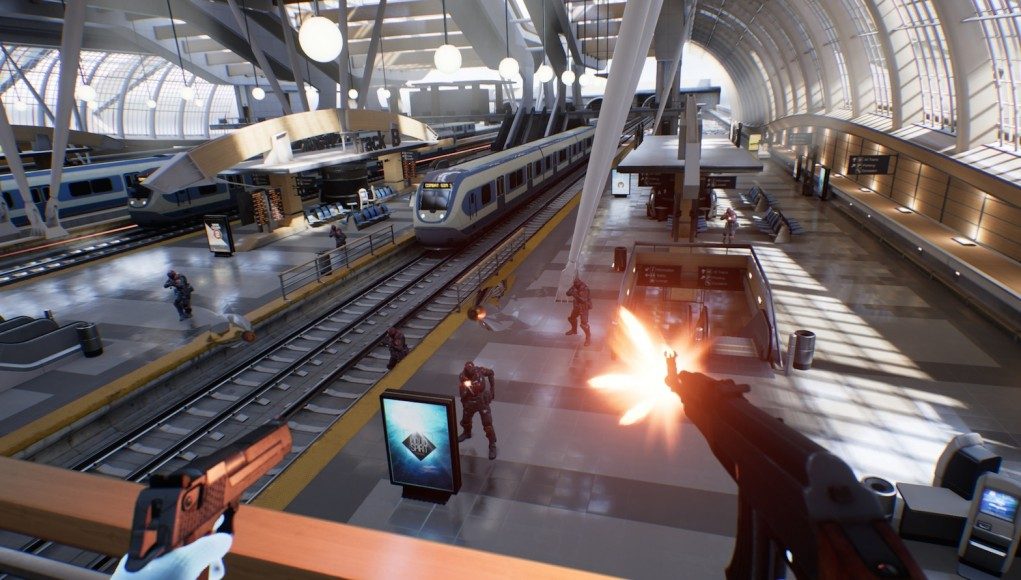 Epic Games’ Nick Whiting paired up with Nick Donaldson again before Oculus Connect 2 to build the Bullet Train demo over the course of 10 weeks. They wanted to dogfood the Unreal Engine to optimize the rendering for VR, but also experiment with Oculus’ motion-tracked Touch controllers. They had the Toybox demo to use for inspiration, and so they set out to maximize the interaction fidelity for a game that had a lot of guns and explosions. I had a chance to catch up with Nick at the Seattle VR Expo where he told me about their design process as well as some of the technical limitations that drove some of their design decisions.
Epic Games’ Nick Whiting paired up with Nick Donaldson again before Oculus Connect 2 to build the Bullet Train demo over the course of 10 weeks. They wanted to dogfood the Unreal Engine to optimize the rendering for VR, but also experiment with Oculus’ motion-tracked Touch controllers. They had the Toybox demo to use for inspiration, and so they set out to maximize the interaction fidelity for a game that had a lot of guns and explosions. I had a chance to catch up with Nick at the Seattle VR Expo where he told me about their design process as well as some of the technical limitations that drove some of their design decisions.
LISTEN TO THE VOICES OF VR PODCAST
Audio PlayerNick says that when people get motion-tracked controllers in a VR experience, then one the first things that they do is to try to touch everything. Bullet Train was a very iterative design process, and they noticed that people wanted to interact with the environment, and so they started to add more and more Toybox-inspired interactions.
A lot of people don’t have time to discover the full scope of these interactions in the first time playing through Bullet Train. It’s a brief 6-minute demo where it feels like you’re stepping into a first-person perspective of an action movie, and so it can be a little overwhelming. They decided to add the ability to slow down time to make it less overwhelming, but they also discovered in their 2014 Showdown demo that experiencing your environment in slow motion is really compelling and something completely unique to VR.
Nick talks about some of the action hero-inspired combinations that he was able to pull off in Bullet Train. The most inspiring one was when he once threw a gun at someone’s head, teleported to be right next to him so that he could catch the gun and then shoot someone else. It’s these types of combinations and high-fidelity interactions that he thinks that are going to keep people coming back to play an experience like Bullet Train again and again. He says that the most compelling games and experiences in VR that he’s seen are in a world that you can interact with and have a lot of agency.
Nick also talks about some of the technical limitations that they faced in building their demo, which drove some of their design decisions. Specifically Oculus recommended to the developers leading up to Oculus Connect that having two forward-facing cameras would maximize the tracking fidelity, which meant that if the player turned around 180 degrees that they’d start to lose hand tracking due to occlusion. So Nick talks about how the crafted the teleportation mechanic to ensure that the action was always directly in front of you so that you didn’t have a reason within the game to turn completely around.
There’s been a lot of talk and debate about using the Oculus in a room-scale configuration with the cameras in the opposite corners of the room since the last Oculus Connect, but Nick says that they got around this constraint by designing the Bullet Train demo to ensure that there was always a compelling reason to look forward in order to optimize the experience for a front-facing camera configuration.
Nick mentioned that part of his team’s focus leading up to the consumer launch was to ensure that the Unreal Engine was optimized for all of the other companies developing launch titles. In my interview with Tim Sweeney, he alluded to they were indeed likely working on expanding a Bullet Train-like experience as a full game and title to be released.
Nick did not explicitly mention how his VR development has been continuing since Connect, but it’s likely that they’re continuing to build it out. Perhaps they’re investigating adding more multi-player functionality since it’s something that didn’t have time to fully implement before Connect. VR can be isolating without it, and he says that having a shared space and community within VR instantly makes an experience more compelling.
Become a Patron! Support The Voices of VR Podcast Patreon
Theme music: “Fatality” by Tigoolio







